If one needed a model for what retirement could be, Bill Whitacre would be it. He left his very responsible job as CEO of Simplot, a large and pioneering agribusiness company, just 2 years ago. His endless curiosity has led him to become a later-life global motorcycle explorer taking multi-month trips through some of the least visited most ignored parts of the world with the purpose of bringing back to his community what he learned. When COVID hit his home state of Idaho, he and a couple of business leaders took the initiative to create a COVID testing and tracking system that has been highly impactful in slowing the spread of the disease.
Bill is a man of quiet humble integrity and grit. He is not a splashy guy who seeks the limelight. When his community needs him, he brings his considerable skill set to bear on the problem. Endlessly curious, and fearlessly moving forward, he embodies the sort of person we define as a North Star hidden in plain sight.
“Nothing is as valuable to me as having the experience to satisfy my curiosities”
Since leaving Simplot, you seem very busy. You could just take it easy. What is motivating you to do all the things you are involved in?
I think that I am innately curious and very committed to learning. For me, all of this comes from having the experiences. Yes, I consume a lot of books and ask a lot of questions but nothing is as valuable to me as having the experience to satisfy my curiosities.
Tell me about your thinking around adding value to your community.
I feel that I have been the beneficiary of people that created the community that I got to pursue family and career. Giving back has always been important to me but now I can invest myself at a more significant level.
Creating a COVID Test-and-Tracking System
What is Crush The Curve in Idaho? How did it come about and what does it do?
Last April, there was a job to be done when it came to testing for coronavirus in Idaho. CTCI (not-for-profit) is literally a strike force for businesses, education and assisted living to address the shortfall in testing in Idaho. CTCI was started the first of April. The immediate need for the state was to increase testing but without the infrastructure and a legitimate plan on how to accomplish this. Businesses and institutions were in a quandary for how to plan for testing and even to understand the spread of the virus. We started with antibody testing so we could inventory what the spread was. The initial results showed about a 1.5% infection rate from over ten thousand fairly random samples of testing. Antibody testing didn’t provide the solution to surveillance testing but it did provide insight into the spread.
The biggest challenge was to get the healthcare facilities, health departments, and state to synchronize the planning and execution. There were task forces and committee activities but nothing was moving as quickly as COVID. CTCI resourced materials, testing equipment, logistical planning, not-for-profit status, fundraising and data systems very quickly. This was basically done with a small team of board members/founders and an outstanding executive director in a matter of weeks. By the way, it was all done virtually. It was our own Manhattan Project.
“CTCI resourced materials, testing equipment, logistical planning, not-for-profit status, fundraising and data systems…in a matter of weeks”
Our impact has been significant, with thousands of tests per day and very rapid response to outbreaks. I am proud to be one of the founders that created this with a whole lot of virtual meetings, texting and emailing. Today, we are a primary source for surveillance and quick response testing in our state.
What was the work you were doing at St Lukes?
St. Lukes Health System is an incredible healthcare system in Idaho. My commitment to the system as a board member is one of the most important things that I do. The health and welfare of our communities and citizens has to be job one. It was a point of pride to recently be the Chairman of the Board for this important system.
Healthcare is one of the most complex challenges that I have encountered. The execution and discipline of excellent healthcare, and economics and incentives that challenge the very best minds. At the same time, it has become significantly political. Being on the frontline (board member) of the opportunity to transform a fee-for-service system to a value-based system is valuable and important. There is an intersection of quality outcomes and economics that are important to our future. St. Lukes Health System has been very effective in addressing these.
The COVID challenge has been immense for all hospital systems. St. Lukes Health System has provided significant leadership, made critical decisions about having capacity and PPE in place and is working directly with the governor on adaptive recovery plans. Hospitals are in a challenging position for testing because it is so necessary for them to have rapid result testing for patients and staff.
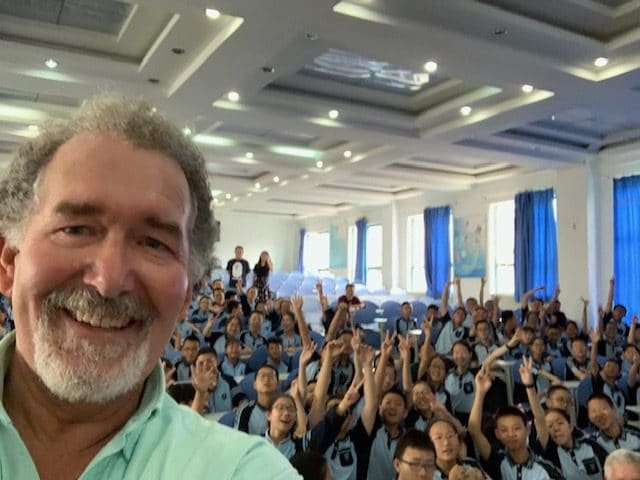
“My adjustment came from literally throwing myself into the interests that I wanted to pursue with more intensity”
You had a big job at a big company; now you don’t. How does it feel? How did you adjust?
The Simplot Company fit me so well. The company has this long-term commitment to food and agriculture. On top of this, the company focused lots of energy on the responsible pursuit of agriculture and related food production. I was so fortunate to be the CEO of the company for almost ten years. I am always proud of the company, always proud to have been part of the company and there are days that I miss being “in the game.” My adjustment came from literally throwing myself into the interests that I wanted to pursue with more intensity.
Why did you leave the company at the time you did?
One of the hardest things that I have ever done was to notify the board and the shareholders of my retirement. I seriously had to stay on message so that it happened because ideally, it would have been interesting to stay as CEO and fully engage with my passion of global motorcycle travel. It doesn’t and can’t work this way. The reality of being 66 years old and traveling another 50-60 countries on motorcycle needed more attention than doing it part-time or periodically.
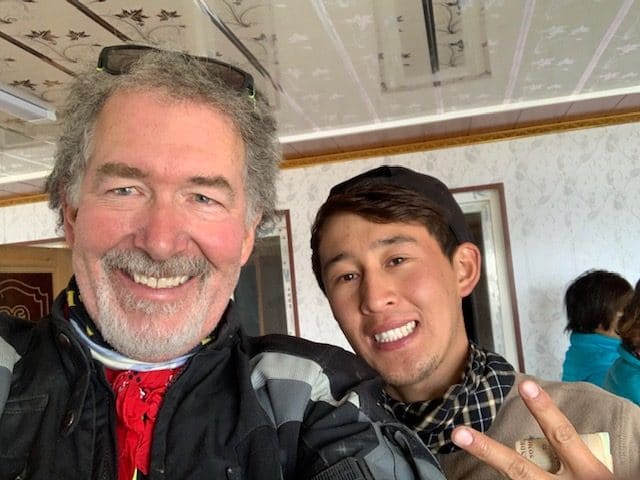
“Have ‘interesting’ be a primary goal for retirement”
What is your advice for other people making that sort of transition?
It feels like many people retire because they are “supposed to.” They are 65 and this is when they qualify for Medicare and it is typical retirement age. This would not be my recommendation. Can you imagine going from the day-to-day intensity of a career to watching CNN all day? The opportunity to get on a different stage or write a new chapter is so big. Epic isn’t necessarily the answer but interesting is. Have “interesting” be a primary goal for retirement. I also really dislike the word retirement. I would rather call myself “chronically unemployed.”
Reading List
What are you reading these days?
The Lincoln Conspiracy by Brad Meltzer. It explains the challenges of the country with Lincoln’s election and the simultaneous succession of the South. I became interested in this topic as the anxiety over the current presidential election was developing.
Some of my other recent reading seems to be around the concentration camps of WW2. When I was in Xinjiang, China, I got to experience the Uyghur “Re-education Camps” and the persecution of the Uyghur Muslims. It really stimulated my curiosity about learning more about the concentration camps of the war. The Things They Carried by Tim O’Brien, Ravensbruck by Sarah Helm and The Stone Crusher by Jeremy Dronfield. This seems to be the way that I read. I typically get focused on one topic with multiple books.
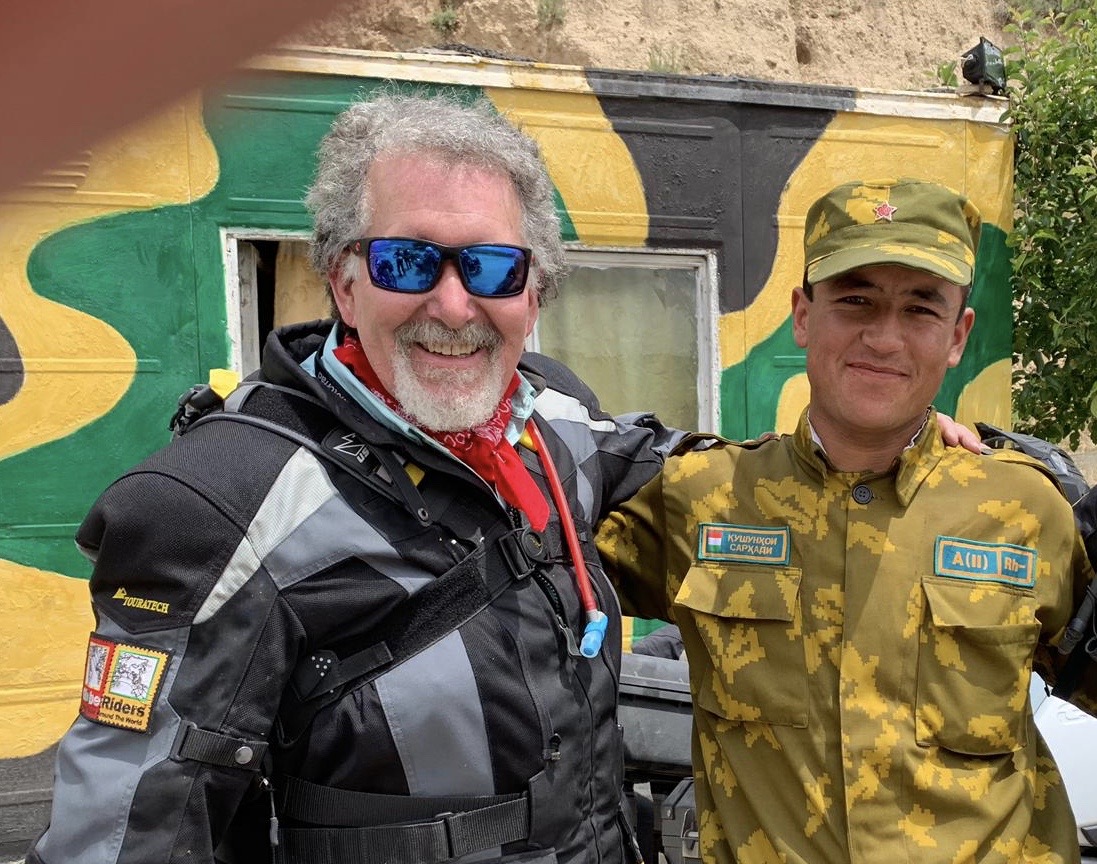
Adventure Motorcycle Travel
What is the BDR? What is the outcome you would like to have for people from it?
Backcountry Discovery Routes (www.ridebdr.com) is a not-for-profit organization that creates off-highway routes for adventure motorcycle travel. We currently have ten routes in the United States. Our work includes rider education, safety and responsible backcountry motorcycle travel. It’s an important organization to me because it provides the backcountry motorcycle community these resources.
What is the interest you have in motorcycle travel?
My dad used to haul us around as kids in a car and a big tent. We went to so many spectacular camping locations in the national parks and forest system. These were significant trips that could last up to three weeks. At the time, I probably took them for granted but then I discovered doing this on a motorcycle that would travel in remote places. It didn’t take me long to realize that this type of motorcycle travel hit my sweet spot. When you have these experiences from a motorcycle, they are much more personal and it involves a much stronger commitment.
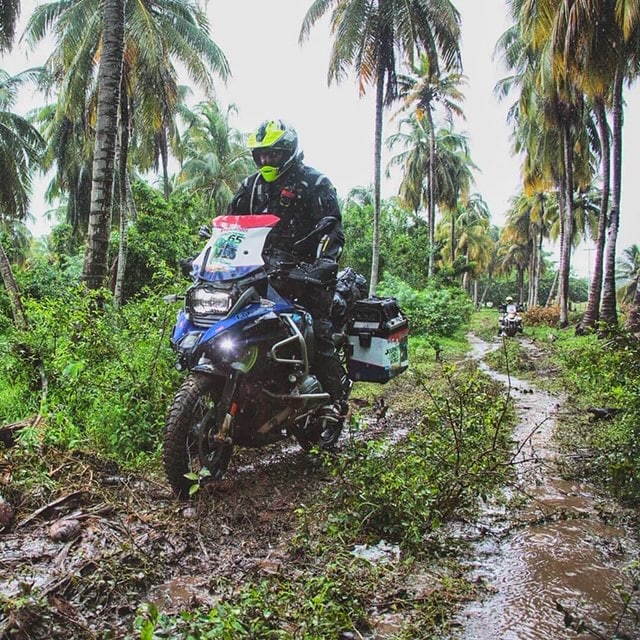
Traveling 8000 miles from Istanbul to Xi’an, China
Last year you went from Istanbul to Xi’an, China, 8000 miles through Muslim countries. What did you learn that you think would surprise people?
I arrived in Istanbul on the first day of Ramadan. The trip began with a major feast in front of the Hagia Sophia Grand Mosque. It was so exciting to be offered food from families at this gigantic picnic. For the next 60-70 days and 9 countries, I got to be a part of the Muslim culture on a day-to-day basis. Experiencing a culture from the inside out provides such insight. I never lost interest in the kindness and generosity of the Muslim people that I interacted with.
I understand that it is difficult to get a Chinese driver’s license. How did you manage that?
This is probably ridiculous but getting this Chinese driver’s license was way cool. The Chinese government just doesn’t issue driver’s licenses to Chinese over 60 years old. Here I am 66 years old, an American and on a motorcycle. If I remember right, there was a few hundred dollars and waiting around for a day to get this. What a souvenir.

“Travel provides us with this incredible understanding of the people and cultures of the world”
What is the difference between an explorer and an adventurer?
My friend, David Concannon says an adventurer goes from here to there, comes back and says: “This is what I did.” An explorer goes from here to there, comes back and says: “This is what I learned.” There’s an important difference.
How do you share what you have learned from your moto trips?
I challenge myself with how I share my learnings. I am a mix of Anthony Bourdain and James Michener with my thoughts on travel. What I do want to share is that travel provides us with this incredible understanding of the people and cultures of the world. Don’t get me wrong, I would really like to go to every single World Heritage Site in the world. This is exciting. At the same time, I am so pleased to engage with the local llama farmer in The Andes or a family that provides lunch to remote travels in Uzbekistan. I get to experience and learn so much but I would like to find a way to share without being an Anthony Bourdain clone.
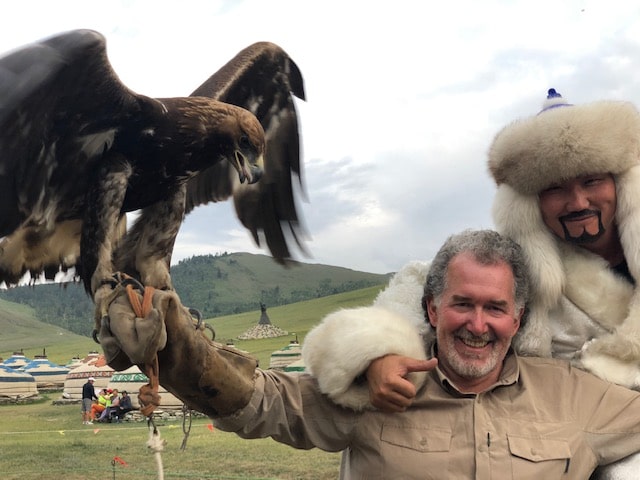
Global Motorbiking
What are some of the recent big moto trips you have done? How long do they take?
A few years ago, I was part of a team that did Expedition 65 where we rode the vertical length of South America. It was a spectacular experience. Since then, it has been Australia, New Zealand, Mongolia, and The Silk Road from Istanbul to Xi’an. Mixed into this is Mexico (numerous times), Canada and Alaska. This past summer, I was planning on Europe and particularly Eastern Europe but the virus took care of this.
Who goes on the trips with you? Why do the others do it?
I have an eclectic group of friends that I get to ride with on many of these adventures. There is truly a bonding experience that comes from all of us being together in frequently tough conditions wondering where we are going to sleep tonight or get fuel. It seems that everyone has a different reason for doing this. Some are just about the thrill of riding motorcycles, some are about sightseeing and others are about the freedom that the adventure allows. Ultimately, there is a more holistic experience that develops.
After you have completed all of your global motorcycle trips, what are your ambitions?
Well, I have four more of the big trips planned to SE Asia, Japan to Munich, Capetown to Cairo and Europe and Eastern Europe. Once these are completed, I want to document the learnings and share them with others. I am always asking myself how I take these experiences and add value to others. It’s a question that I frequently consider. Once the mitigation of the virus allows us to travel, I anticipate that I will finish when I am seventy. I want to celebrate my career and my adventures with my spectacular wife that is an amazing adventurer in her own right. Her support for my interests are so wonderfully gratifying.
LEAVE A REPLY
The ideas expressed here are solely the opinions of the author and are not researched or verified by AGEIST LLC, or anyone associated with AGEIST LLC. This material should not be construed as medical advice or recommendation, it is for informational use only. We encourage all readers to discuss with your qualified practitioners the relevance of the application of any of these ideas to your life. The recommendations contained herein are not intended to diagnose, treat, cure or prevent any disease. You should always consult your physician or other qualified health provider before starting any new treatment or stopping any treatment that has been prescribed for you by your physician or other qualified health provider. Please call your doctor or 911 immediately if you think you may have a medical or psychiatric emergency.




I have followed you for a while now. Your endeavors are intertesting and undoubtly inspiring for many. Glad you are in pursuit of the interesting things in life besides making money and watching tv. Stay after it my friend. Time management means more now than it ever did in our careers.
Very cool to watch the adventures Uncle Bill. Bill has always gone and experienced so many things in his life, “retirement” from the corporate world was able to really catapult what he loves to do. Personally, Bill’s experiences are a motivator to live my own life to its fullest and find new adventures. It has taught me to be more productive in the day to day live so I can do more of what I want to do. All this leaves with one question, “What is next and how fast can I get there?”
The article is so informative! I love following your adventures on FB, too!
So cool to learn of your past travels and life! Such great advice for all retirees! Find your passion!! Brmmmm! My motorcycle sound!
Adieu, Renée
Love hearing about your adventures and life, Bill, on FB. Great seeing you recently. Growing up and camping with you, I feel we were all lucky to have parents that showed us love and the love of nature and geography and only realized once I was older that not all kids had those opportunities. Keep on going and sharing!
Bill, not quite chronically unemployed (but close!), I found your recital of your accomplishments and travels “post Simplot” amazing in their embrace of Idaho healthcare, exploring, and the global community. Sometimes, age makes us more egocentric than altruistic. Fortunately for all of us who share your experiences on FB and through this article, your humble altruism shines through as does your treating retirement as freeing rather than restrictive. You and Joan both are inspirations. Explore on! And please continue sharing.
He should write a book! I want to know so much more about his career and more about his trips.
Have had the opportunity to ride with Bill in his home state. Bill is the epitome of a true ambassador for the human race! If more of us could live our lives with the level of passion Bill does, the world would become much smaller and more United.
I took up motorcycling at age 56 and it was the best decision I’ve made in a long time. Incredible way to see and feel the world all over again. I ride a BMW GS Adventure, like Bill’s. He has inspired me to go farther and wilder on that baby!